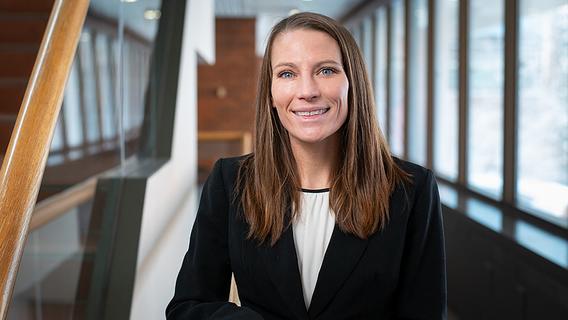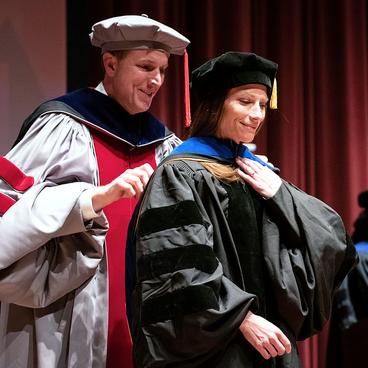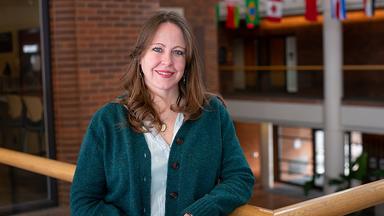
By Ann Nordby
Immigrants and refugees face many barriers when they resettle in the United States. To build their futures, they may face obstacles such as language, a lack of documentation, transferring professional credentials, and many more. For newcomers, finding solutions in their new communities can be confusing.
Kimberly Horner, a recent PhD graduate from the Humphrey School of Public Affairs, is researching how layers of government can work together in support of immigrant and refugee communities.
"Immigration happens at the local level, even though immigration is a federal issue," she explained. "Communities that do a good job of welcoming immigrants have better outcomes for everyone."
Doing a good job might mean offering language classes, work placement programs or help filing immigration paperwork. These supports hasten the day when immigrants can participate fully in their new community.
Because the needs of newcomers are diverse, local solutions require a cross-disciplinary approach. Horner said that approach was embedded into her program at the Humphrey School, and into everything she does.
"The Humphrey School faculty has really helped connect me to opportunities and to community groups," Horner said. “They're excellent at posing really challenging, thorny questions to grapple with."
Horner has a background of direct work with immigrant populations. In the years between earning her bachelor's degree and her master’s degree in migration studies at the University of Oxford, Horner worked in nonprofit organizations and education. But she wanted to make a bigger impact for families. She decided that she wanted to influence policy to make it easier for all of them.
Humphrey School approach
She chose to study at the Humphrey School for two reasons. The first was that she felt a great connection with Professor and Associate Dean Ryan Allen, who became her advisor. She said he supports her commitment to stay engaged with her community and its nonprofit organizations.
The second was the PhD program's cross-disciplinary approach.
"The Humphrey School does a great job of promoting community connections in their work and allowing for interdisciplinary work. For me, that means taking classes and working on projects with the Sociology Department, the Law School, the Minnesota Population Center, the Immigration History Research Center, and the Human Rights Lab. The interdisciplinary focus at Humphrey School allows people to bring their own skill set and work with people who have different skills."
"I hope that the research that I do can help create communities where more people are able to thrive and accomplish their dreams," Horner said. "Through research we can help communities to better understand one another and make connections, by highlighting strengths and values that everyone brings."
Studying how immigrants can thrive
All Humphrey School PhD students are fully funded for four years and work closely with their advisors. Horner said Allen and all of the Humphrey School faculty have supported her work on a wide range of topics.

She studied the disparities in COVID mortality rates between native-born Minnesotans and foreign-born residents. She researched the treatment of immigrants and refugees in immigration court. She looked into the data practices of city offices supporting immigrant and refugee integration. She examined the role of storytelling in immigration proceedings.
In 2023, she and Allen co-wrote a paper about recently resettled refugees, "Penalties and Payoffs." It examined how much refugees benefited from language lessons and other efforts they made to settle in. Allen and Horner's work together continues.
Horner says the question that undergirds all of her work is: How can we build communities where more people feel welcome and are able to thrive and accomplish their dreams?
As she completes her degree after five years at the Humphrey School, Horner said she’s fortunate that her research was fully funded, most recently through a research assistantship with the Immigration History Research Center.
She defended her dissertation in late May, and in August she will begin a two-year postdoctoral position at St. Olaf College in Northfield, Minnesota, hosted by its Institute for Freedom and Community. In that position, Horner will teach courses in the political science department and continue her own research.
Horner said that Minnesota has drawn her in, both intellectually and personally. As a serious competitive runner, she appreciates the outdoor life that the area has to offer. She recently competed in the Olympic trials in the marathon.
"I've built community in a number of ways," she said. "Community is important to me."

